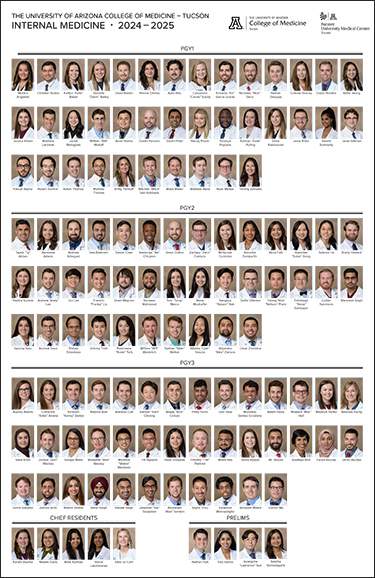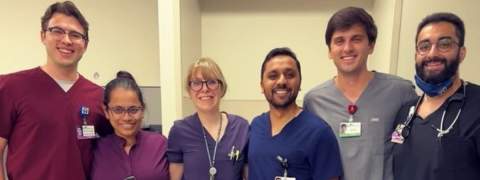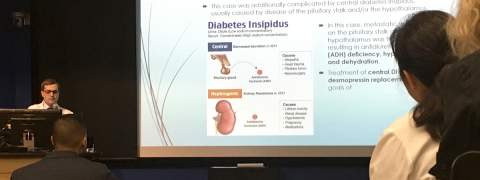Internal Medicine Residency – Tucson Campus
Housestaff training in internal medicine at the University of Arizona originated in 1972. Since then, we’ve graduated more than 700 physicians trained in all aspects of primary care. We consider this training experience to be highly competitive and successful. Residents learn the fundamentals of inpatient medicine while caring for patients on the general medical wards and in state-of-the-art intensive care and cardiac care units. The experience is broadened by ample exposure to ambulatory medicine. We also enjoy one of Arizona’s highest board passage rates.
Our primary clinical partner is Banner – University Medical Center Tucson, which is part of the academic division of Phoenix-based Banner Health along with multiple clinical facilities in Tucson that include the Banner – UMC South community hospital, UA Cancer Center Peter & Paula Fasseas Cancer Clinic and, adjacent to that, the new adult multispecialty outpatient center known as Banner – University Medicine North.  Along with other community partners such as the Southern Arizona VA Healthcare System (SAVAHCS), residents are now able to care for patients in a range of settings: a University hospital, community hospital and VA medical center, in addition to various outpatient clinical operations.
Along with other community partners such as the Southern Arizona VA Healthcare System (SAVAHCS), residents are now able to care for patients in a range of settings: a University hospital, community hospital and VA medical center, in addition to various outpatient clinical operations.
Residents are expected to focus on three major goals — education, clinical skills and research excellence. Research opportunities are plentiful and encouraged. Our intent is to provide the necessary background for the successful practice of medicine and to allow growth and interest in clinical and basic sciences research at an early stage in training. To accomplish this, three major teaching facilities are utilized: Banner – UMC Tucson, the SAVAHCS, and Tucson Medical Center. In addition, outpatient continuity clinic experiences are available at Banner – UMC Tucson, SAVAHCS as well as with specialty and general practice groups and community physicians.
[Our Current Residents]
Meet our Residents

Resident News - Internal Medicine Residency - Tucson Campus
Accreditation by the National Accreditation Program for Breast Centers (NAPBC), a quality program administered by the American College of Surgeons, acknowledges center’s excellence. This recognition makes it the only accredited breast cancer center in Tucson and one of just three in Arizona.
The stroke survivor and DOM operations support program manager embraces recognition to help raise awareness, funds for women’s heart health for Southern Arizona Chapter of the American Heart Association. Read about her experience and help her win the title!
The Department of Medicine took 19 of 68 total awards presented Feb. 27 at the HSIB Forum. Eight divisions were represented by faculty winners, with three each to Inpatient Medicine and General Internal Medicine, Geriatrics & Palliative Medicine, two to Hem-Onc, PACCS and Nephrology, and one for Cardiology, Endocrinology and Infectious Diseases. See who won and a mini-photo gallery.
Events
Lecture or Seminar
Immunobiology Seminar Series
Grand Rounds
TMC Internal Medicine Grand Rounds
Lecture or Seminar
Cancer Biology GIDP Seminar Series














![Image of signage outside the University of Arizona Cancer Center at Banner – University Medicine North, 3838 N. Campbell Ave., Tucson [Image of signage outside the University of Arizona Cancer Center at Banner – University Medicine North, 3838 N. Campbell Ave., Tucson]](https://deptmedicine.arizona.edu/sites/default/files/styles/1x_smartphone/public/banner_north-ua_cancer_center_signage_card.png?itok=n2C0WobI×tamp=1741970606)
![Image of Dominica Padilla for Woman of Impact fundraising campaign by Southern Arizona Chapter of the American Heart Association [Image of Dominica Padilla for Woman of Impact fundraising campaign by Southern Arizona Chapter of the American Heart Association]](https://deptmedicine.arizona.edu/sites/default/files/styles/1x_smartphone/public/1-woman_of_impact_padilla_card.png?itok=rdfqsP9q×tamp=1741630651)
![Images of Department of Medicine faculty who won 2025 College of Medicine - Tucson Faculty Awards presented Feb. 27 at the HSIB Forum on the U of A Health Sciences Tucson campus. [Images of Department of Medicine faculty who won 2025 College of Medicine - Tucson Faculty Awards presented Feb. 27 at the HSIB Forum on the U of A Health Sciences Tucson campus.]](https://deptmedicine.arizona.edu/sites/default/files/styles/1x_smartphone/public/_com-t-faculty-awards_2.27.25_card.jpg?itok=0LBgB-HQ×tamp=1740891873)